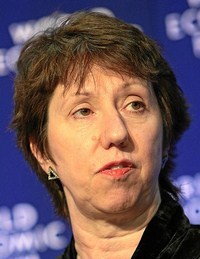Under new President Hasan Rouhani, Iran has moved swiftly to repair communication channels with the U.S. and speed up negotiations over Iran’s nuclear program. So far, much attention has been paid to how Washington will react to Rouhani’s diplomatic outreach. But success in these negotiations will also necessitate an improved Iranian relationship with the European Union.
While there is skepticism about how flexible the Islamic Republic can be and whether Presidents Hasan Rouhani and Barack Obama can deliver on whatever deal might come out of the negotiation process, an equally important question is what the EU can offer to get the Iranian president to compromise and help him survive the onslaught of critics back home. In short, what will be the EU’s response to Iran’s overtures?
The EU as a whole is represented in negotiations over Iran’s nuclear program by EU foreign policy chief Catherine Ashton, who officially chairs the talks. The three member states at the table—Great Britain, France and Germany—form the E3 in the E3+3, the European name for the P5+1, which also comprises the U.S., Russia and China. The E3 constellation came about as a result of the Bush administration’s initial refusal to negotiate with Tehran following the revelation of Iran’s clandestine uranium enrichment program in 2002. While the U.S. eventually backed renewed talks in 2006 after an initial E3-Iran framework agreement fell through in 2005, it refused to participate directly until 2008.

